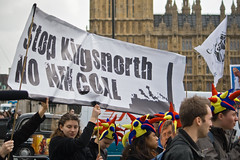World on fire: Imagine you were an energy minister and you had been warned repeatedly by thorough science that adding  more carbon emissions to the atmosphere was like chucking fuel on the fire of global warming. You can see that authorising more emissions would be guaranteeing life-threatening problems for next generation; our children. So you wouldn't then go ahead and approve a whole new set of electricity-generating plants based on burning that most polluting of fuels, coal, would you? Well actually, yes you would. For that is what many governments are either doing or are about to do. NASA climate
more carbon emissions to the atmosphere was like chucking fuel on the fire of global warming. You can see that authorising more emissions would be guaranteeing life-threatening problems for next generation; our children. So you wouldn't then go ahead and approve a whole new set of electricity-generating plants based on burning that most polluting of fuels, coal, would you? Well actually, yes you would. For that is what many governments are either doing or are about to do. NASA climate scientist James Hansen has done his utmost to carry his no-more-coal-plants message to many governments, only to be ignored. The climate campers in Britain have done their best to publicise the stupidity of approving new coal-fired power stations, only to be throttled by heavyweight police action clearly authorised directly by a government set on the blinkered short-term view despite all their rhetoric about the need to get out of fossil fuels. It seems to be a case of "Lord make me chaste but not yet". Depressing, isn't it?
scientist James Hansen has done his utmost to carry his no-more-coal-plants message to many governments, only to be ignored. The climate campers in Britain have done their best to publicise the stupidity of approving new coal-fired power stations, only to be throttled by heavyweight police action clearly authorised directly by a government set on the blinkered short-term view despite all their rhetoric about the need to get out of fossil fuels. It seems to be a case of "Lord make me chaste but not yet". Depressing, isn't it?
Energy for the future - renewables: Everyone knows what these are by now and campaigning NGOs like Greenpeace and Friends of the Earth have rightly put a lot into getting them adopted into energy plans (whilst vehemently rejecting nuclear). The difficulty with renewables is that they are unreliable. Wind turbines notoriously generate electricity not when we need it but when the wind blows. This means that, overall, they are only generating anything like their rated output for around 25-30% of the time. What happens for the other 70-75%? The hope is that, eventually, all the different forms of renewables (wind, solar, wave, PV, tides) will be linked together via a continent-wide supergrid and employ new means of energy storage. This may work but it is still decades down the line. So we're exhorted to reduce out carbon footprints... and a few of us make valiant attempts to do this. But it's not enough; nowhere near enough. The demand for electricity is bound to increase rapidly as more people travel by the electrically-powered vehicles -trains, buses, cars - which will be replacing hydrocarbon power: petrol/gasoline, diesel and LNG.
Energy for the future - nuclear: Environmentalists Mark Lynas and George Monbiot have both crossed the rubicon and, albeit reluctantly, adopted James Lovelock's position, rejected by most Greens and set out clearly in The Revenge of Gaia: we have to embrace nuclear power if we are to survive.
"I have now reached the point at which I no longer care whether or not the answer is nuclear. Let it happen - as long as its total emissions are taken into account..." George Monbiot in The Guardian
"Increased use of nuclear (an outright competitor to coal as a deliverer of baseload power) is essential to combat climate change..." Mark Lynas in New Statesman.
Why nuclear? It's that continuity problem; baseload. All grids, to be stable, need to have a good percentage of reliable, continuous generation to which other generating capacity, like pumped storage, can be added at peak times. Coal and nuclear stations are rather well suited to long periods of steady generation, just what renewables can't deliver.
Nuclear, the lesser of two evils? I know about the dangers of nuclear power. I've had a tour around the UK's Sellafield reprocessing facilities and seen the troubled vitrification plant where the most virulent highly active radioactive waste is made into glass blocks for storage. It's not nice stuff. But it's better than coal as Lovelock has made very clear. Going nuclear, which seems to be about to happen anyway, is the lesser of the two energy-producing evils.
No time to waste but let's put safety first: Governments need to get on with nuclear build now, not in 5 or 10 years time. 'Fourth generation' inherently safe reactors are not yet beyond prototypes. Even 'off-the-shelf' nuclear plants take some years to build so to make an impact on Big Coal, they have to be built right away instead of coal plants using existing designs. But no-one wants another Chernobyl. Oddly, there is one sure way of making nuclear safe that never seems to get a mention: build the plants - or at least the reactor and primary coolant circuits - underground. The advantages of doing this are pretty obvious when you think about it:
- immune to military attack from the air containment unbreachable (given proper choice of ground conditions, hydrogeology and rock types) and so immune to attack from, say, a suicide bomber. Even major accidents would be better contained than anything above ground
- no need ever to remove irradiated fuel assemblies.
- when the reactor reaches the end of its operating lifetime, the whole facility could be sealed, complete with its spent fuel. Monitoring would be needed but because nothing is above ground, access would only be minimal
- planning consent more likely to be straightforward since there wouldn't be much surface infrastructure to object to. Most of the usual public fears and objections wouldn't be serious issues
You can judge for yourself here.




2 comments:
Great post!
The National Wildlife Federation recently finished a send-a-letter-to-the-EPA widget and Facebook application that sends an official message to the Environmental Protection Agency urging them to recognize the impact greenhouse gases are having on our planet. We're trying to drum-up up some support for their cause. If you're so inclined, we'd appreciate a link to either application or simply spread the word! No obligation, but thanks for your support in advance!
Widget: http://www.clearspring.com/widgets/48dd4c8e92491714
Facebook Application: http://apps.new.facebook.com/speakupforwildlife/
Good news! My company just released a website to encourage people NOT TO PRODUCE MORE WASTE by throwing their old things out, but to swap them! Online shopping that is CHEAP and so much fun! Help save the environment!
http://bit.ly/onlineyardsale
Post a Comment